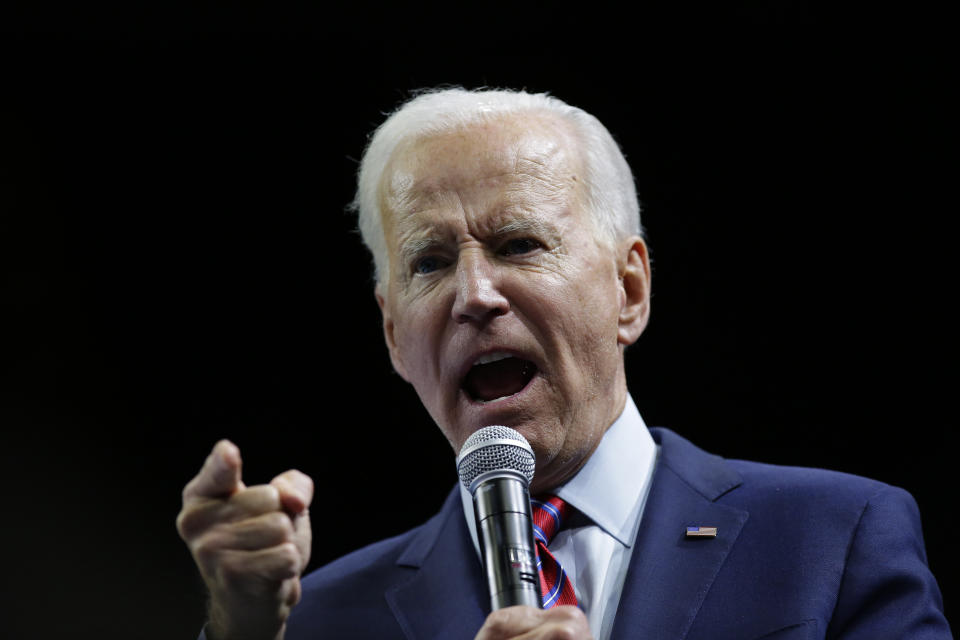In the Warren-Biden battle, sexism could be her undoing
Welcome to 2020 Vision, the Yahoo News column covering the presidential race with one key takeaway every weekday and a wrap-up each weekend. Reminder: There are 89 days until the Iowa caucuses and 363 days until the 2020 election.
Elizabeth Warren has been stalling in the polls. Sexism may be part of the problem. And attacks from her Democratic rivals — namely Joe Biden — could make that problem even harder to overcome.
“There’s just something about her that I just don’t like,” Floridian Elysha Savarese told the New York Times as part of a new round of polling that showed Warren losing to Trump in key swing states. “I just don’t feel like she’s a genuine candidate. I find her body language to be very off-putting. She’s very cold. She’s basically a Hillary Clinton clone.”
The poll, according to the Times’ Nate Cohn, will “likely bolste[r] concerns among some Democrats that sexism could be a burden on [Warren’s] candidacy.”
To be fair, there are other reasons why the Massachusetts senator has seen her national polling average slip over the last month from a high of nearly 27 percent to about 21 percent today. She has been attacked by rivals as inauthentic, impractical and divisive. She has embraced Medicare for All, a program that makes many Americans nervous. And after months of aiming her barbs at President Trump, she recently started criticizing her fellow Democrats as well.

But as the Iowa caucuses approach, new data suggests that the main drag on Warren’s candidacy is concern among Democratic voters that she can’t beat Trump — and that concern may be gendered.
Earlier this week, the Times and Siena College released a large survey of voters from the six states that Trump won by the slimmest margins in 2016: Michigan, Pennsylvania, Wisconsin, Florida, Arizona and North Carolina. They showed Biden defeating Trump among registered voters everywhere except Michigan (a tie) and North Carolina (where Biden trailed by 2). They showed Bernie Sanders defeating Trump in Michigan, Pennsylvania and Wisconsin. And they showed Warren tied or losing everywhere except Arizona. Among likely voters, she did even worse.
“Not only does [Warren] underperform her rivals,” wrote Cohn, “but the poll also suggests that the race could be close enough for the difference to be decisive.”
So why is Warren lagging behind Biden and Sanders in battleground matchups with Trump? To find out, the Times/Siena College survey asked the 6 percent of swing-state voters who support Biden but not Warren why they feel that way. Their answers were revealing. The biggest reason they gave is that Warren is too far left (a statement that 52 percent of these Biden-but-not-Warren voters agreed with). But the second biggest reason was gender. When asked whether they agreed with the statement that “most of the women who run for president just aren’t that likable,” 41 percent of these Biden-but-not-Warren voters said yes.

That number neatly matched the share of Biden-but-not-Warren voters who said they had an unfavorable view of the Massachusetts senator (47 percent).
Typically, political pollsters gauge sexism by asking respondents whether they would vote for a woman for president. Almost everyone knows they’re supposed to say yes, and they do. Cohn and his colleagues chose a different and very specific way of wording their query in order to capture the sexism that might be lurking below the surface.
“We were trying to give people permission to say that, in their mind, there’s just something wrong with the women who have run for office, without making them say they don’t want a woman to be president,” Cohn told the Daily. In other words, a woman president is fine in theory; it’s just the women who actually decide to run — whether it’s Clinton, or Warren, or Kamala Harris, or Amy Klobuchar — who fall short.
Or, as Savarese said of women candidates in general, “They’re super unlikable.”
Sexism is difficult to measure, and even more difficult to disentangle from likability. Who’s to say that voters such as Savarese wouldn’t find Warren “off-putting” and “cold” if she were a man? Yet the research does suggest that sexism hurt Clinton in 2016. For instance, a 2017 Blair Center Poll that used a tool called the Modern Sexism Scale to test for resentment toward women through questions about feminism and women in the workplace found that the Sanders primary voters who didn’t vote for Clinton in the general election were more sexist than those who did.
Sanders, says Cohn, is “one interesting lens for considering this.”
“He fares better against the president than Warren and worse than Biden,” Cohn told the Daily. “He’s basically halfway in-between the two. Part of the reason why he would underperform Biden is because he would lose some of these voters who are against a more left-leaning liberal Democratic candidate. But perhaps he could fare better than Warren, despite having a fairly similar set of views on the issues, because there’s just something about Bernie that makes him more attractive to voters than Elizabeth Warren. I think you could argue that gender is one of the principal factors that we have to consider there.”

Either way, views like these benefit Biden — and in recent days the former vice president has launched a line of attack on Warren that could resonate in part because key voters already tend to view her as unlikable.
“Some call it the ‘my way or the highway’ approach to politics,” Biden wrote Tuesday on Medium. “But it’s worse than that. It’s condescending to the millions of Democrats who have a different view.”
He continued, “It’s representative of an elitism that working and middle-class people do not share: ‘We know best; you know nothing.’ ‘If you were only as smart as I am you would agree with me.’”
“It’s just something we don’t do in our party,” Biden added Wednesday on SiriusXM’s Urban View. “It’s not who we are.”
Biden’s elitist charge is nothing new; previous Democratic nominees John Kerry and Al Gore both battled similar stereotypes. Yet whether it works on Warren remains to be seen. (Republican Scott Brown tried a similar approach in his 2012 Senate reelection campaign against her and wound up losing by 7 percentage points.)
In one sense, the elitism case against Warren seems thinner than the case against Gore (a St. Albans-and-Harvard-educated son of a senator who sighed pedantically during debates with George W. Bush) or Kerry (a scion of the Forbes family who attended St. Paul’s and Yale, spoke fluent French, windsurfed off Martha’s Vineyard, married a billionaire and ordered Swiss on his cheesesteak). Yes, Warren was a tenured professor at Harvard, but before that she grew up in Oklahoma on the “ragged edge of the middle class,” as she likes to remind everyone who attends her rallies. And if forcefully arguing that your policies are superior to your rivals’ is all it takes to be considered “condescending” to “working and middle-class people,” then everyone who has ever run for president would be guilty.

But then again, Warren’s predecessors were men. She is a woman. Any broadside that touches on her likability (or lack thereof) is bound up with voters’ complicated views on women in politics.
So-called electability works two ways. On the front end, it materializes in general-election polls as lower numbers than other Democrats in head-to-head matchups with Trump. On the back end, it shows up in primary polls when anxious Democrats decide to defect to other, more “electable” Democrats — the ones who fare better against the president in the polls. It’s a self-perpetuating cycle.
What’s clear from the Times/Siena College survey is that there are a sizable number of swing voters — “disproportionately male and working class,” according to Cohn — who tend to find Warren “unlikable,” along with a larger number of Democrats inclined to worry that this dynamic makes her “unelectable.” By saying that Warren is representative of “an elitism that working and middle-class people do not share,” Biden is targeting both groups at the same time.
If the attack works, its success may have less to do with Warren’s Harvard credentials than whatever it is about her that voters “just don’t like.”
_____
Download the Yahoo News app to customize your experience.
Read more from Yahoo News:

 Yahoo Finance
Yahoo Finance 



